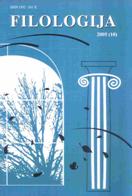Palangos ir Nidos miestų konotacijos
Connotations of the Resort City Names Palanga and Nida
Author(s): Ilona Sideravičiūtė-Mickienė, Saulė JuzelėnienėSubject(s): Language and Literature Studies
Published by: VšĮ Šiaulių universiteto leidykla
Keywords: connotation; denotation; semantics; collocations; corpus linguistics
Summary/Abstract: The paper aims at investigating the connotations of the names of the cities Palanga and Nida. The collocations of these name words were compiled and semantically investigated. The names of Palanga and Nida were investigated compiling their occurrences from state wide, popular and local press. The press texts were taken from the Lithuanian language texts database. Research data was evaluated statistically using statistical methods. To evaluate results more accurately, the psycholinguistic experiment was carried out, were the most frequent associations were found. From the investigation of the broader context in press and using the experiment results the conclusions may be stated as follows: Most frequently collocations of the Palanga are nouns: Palangos sveikatos mokykla (Health School of Palanga) (11 proc.), ir Palangos miestas (The City of Palanga) (10 proc.); verb: atvykti (to come) (16 proc.), adverb šalia (nearby) (23 proc.). Nida is frequently used in word combination with the noun jūra (the sea) Baltijos jūroje ties Nida (In the Baltic sea nearby Nida) - 65 proc.; and in collocation with verb plaukti (to go by boat) plaukti į Nidą. It is also occasionally used with adverbs of time: vakar (yesterday) and pernai (last year) – vakar Nidoje, pernai Nidoje. In a broader context connotations of Palanga may be stated as follows: a) associated with cheap rest, noicy, crowded place, b) associated with nostalgia, and beautiful past; c) associated with health improvement. There few connotations of Nida as well: a) associated with a place of exception, very special place; b) associated with the beauty of nature; c) associated with higher culture of communication and d) associated with sport activities.
Journal: Filologija
- Issue Year: 2005
- Issue No: 10
- Page Range: 70-75
- Page Count: 6
- Language: Lithuanian

